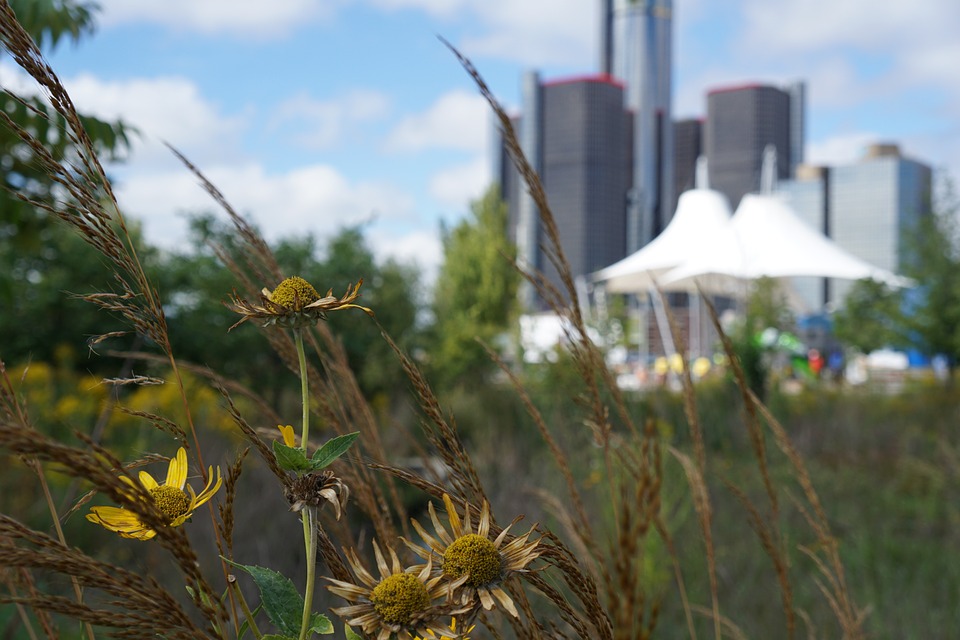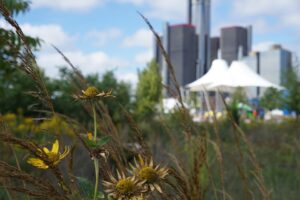Environmental Justice- Detroit’s Air Pollution
8 min read
Mahmoud Alkhuzaee
All around the world, there are many environmental issues that plague different landscapes, cultures, and people. Many if not most of these problems arise from man-made things like pollution, deforestation, and many other issues that contribute to climate change. In our area of Metro-Detroit (Southeast Michigan) we also have many environmental issues. These issues can be referred to as injustices, as more times than not corporate greed, industry, and our politicians fail their people and allow for this to happen. One particular issue that plagues my area is the air pollution in the Southend of Dearborn. This pollution affects many of my personal friends, and based off of the evidence it is quite severe. People are getting sick, waterways polluted, and year by year things have been getting much worse than before. Thus, something needs to be done.
Dearborn’s Southend is an industrial area in which companies such as AK Steel, Ford, and Rouge Steel just to name a few operate (umich). Although many people in our area are employed through companies like these, we cannot sacrifice the health of many for economic benefits. People in the Southend and in many surrounding areas are exposed to high levels of air and water pollution (umich). Moreover, a very high amount of Southend residents experience asthma, foul odors, and other respiratory issues (Martin). Although some local politicians and representatives have brought this issue up in town hall meetings and forums, they clearly are not doing enough (Martin). Therefore, I am writing to raise awareness, fight for the rights and achieve justice for those who are affected by this, and attempt to draft somewhat of a solution. We cannot continue to allow our neighbors in the Southend to experience tyranny that is ultimately coming from greed. As a social justice advocate I feel like it is my duty to do what is right and defend something that is basic; the right to having clean air in and around your neighborhood.
Now that we’ve established the concern, we have to look at the facts. According to the CDC, 12.5 percent of residents in the Southend have asthma (umdearborn). The national average for asthma is around 6.5 percent (CDC). Based on this, we can conclude that the problem is severe, as the average half as much as what we see in the Southend. Moreover, in 2018 local industries agreed to add 1000 more tons of pollutants per year (Matheny, Laitner). Of these 1000 tons, “as much as 913 additional tons per year; nitrogen oxides by up to 416 tons per year.” will be added into the air in the Southend (Matheny, Laitner). Another aspect of this is economic. The population of the Southend consists of many minorities; of these residents 70% percent are considered low income and 60% percent are not proficient in the english language (Matheny, Laitner). Essentially, these companies are coming into the area, polluting, then increasing their emissions, and targeting/affecting people who are poor and who cannot speak english proficiently. This is clearly a social justice justice issue, as poor immigrants are being oppressed by these corporations.
After establishing all of the problems with the Southend and its pollution, we have to now focus on a solution. In an ideal world, the factories would not be there in the first place. However, we cannot approach this from an idealistic stand-point. Instead we have to be realistic. Thus, we need to fight for tougher EPA regulations, the use of clean energy methods, and any other tactics that reduce the environmental impact of these factories. All across the United States, factories are beginning to implement renewable energy into the way they manufacture their goods (Armstrong). Although it can be costly to start using these methods, the factories will actually save money in the long run (Armstrong). Moreover, it will decrease the negative environmental impact that it has on the Southend. Essentially, the only real way to stop this phenomenon is to lobby for tougher environmental regulations and to urge these factories to use clean energy as their main source of power.
After identifying our goals, we need to set a plan on how to achieve them. First off, we need to start a team of social justice advocates, volunteers, and experts. Through this team we will raise awareness with social media, news outlets, etc. After gaining some steam and popularity, we will then reach out to local policy makers, officials, and politicians. Personally, I had Abduallah Hammoud in mind. Months ago, Abduallah organized a rally against the 1000 ton increase in pollution and brought the issue up to the State House of Representatives (Walker). Based off of this, and the fact that Hammoud is someone who grew up not too far from the Southend, I feel like he his a genuine and honest politician who can help us draft some sort of campaign, lobby, or deed to impose a carbon tax on the Southend factories. With this, it will force the factories to either produce less emissions or it will push them to use clean energy. Either way this would ultimately benefit the residents in the Southend that are currently facing this problem.
Since we now have an overview of the issue and a solution, we now need to layout all of the stakeholders within this problem. First off, we have the factories. The factories of course do not want to change the way that they do business. They tons of loopholes, lawyers, etc. to ensure that they do not need to change the way that they do business. For them, what’s at stake is the way they are able to operate at a profit maximization point of view. They can essentially skip the regulations and updates on how they power their plants in order to keep things cheap and make as much money as possible. Thus for them money is on the line.
Another stakeholder is of course the residents of the Southend. For them there is a lot on line. Their health is affected negatively, property values are lowered, and their overall quality of life is not good. If things do not work out, if factories continue to do what they are doing, if nobody does anything to help them, then they will continue to live in misery. Southend residents are harding americans. They are being oppressed environmentally because of their immigrant status and their economic situation. With all of this at stake, residents of Dearborn’s Southend are not asking for much. All they want is a basic human right. Therefore, we need to fight hard for them in order to ensure that their needs are met.
As for the advocates; we are stakeholders as well. People like me and those who want to help the Southend residents have our pride and credibility at stake. We do not want to give the residents false hope. Moreover, we want to be credible in the sense that we do what we said we would do. Politicians like Abduallah Hammoud and others like Rashid Taleb who are also passionate about this issue have their political careers at stake. As they might not get re-elected if they let these residents down. Essentially, whether we are at high levels of government or if we are just advocates like myself, we have pride and reputation on the line. Furthermore, my faith tells me personally to help and advocate for others. Thus, on a religious level, I lose the fulfilment of my duties if I am not able to successfully aid the people of the Southend in achieving environmental reform.
Lastly, the EPA can be considered another stakeholder. Under this current administration, the EPA has been bombarded with many government regulations that actually benefit big companies and are a lot worse for the environment (NatGeo). If this issue gets national awareness then the EPA needs to do something about it. If not, the EPA has it’s own credibility at stake as well. I would certainly begin to question the effectiveness and legitimacy of the EPA if they do not aid the people of the Southend. Without an organization like the EPA, none of this can be achieved
Overall, personally, through this project I would be able to achieve change in the Southend community and in myself, as spiritually it would keep me at peace. Helping this community would only be a stepping stone for other areas like Southwest Detroit or Flint. Although there will be many challenges such as gaining awareness, getting politicians on our side, legal issues with the factories, and getting EPA approval. I still believe in myself and my community, will could get this done. As for social change, this matter shows that as a society we cannot overlook individuals who are of a certain immigrant community or who are poor. We should instead help them because they are our next door neighbors. And it is very important to help your neighbors from a humanitarian and religious standpoint.
To sum this up, Dearborn’s Southend experiences very high levels of air pollution that negatively affect its’ residents. As asthma levels have increased and foul odors along with a low standard of living because of the pollution have also been reported (Martin). Therefore, as an advocate, I feel that it is our responsibility to take matters into our own hands and aid the residents of the Southend. This will be done through lobbying for tougher EPA regulations, raising awareness on both a national and local level, and by forming ties and connections with local/state/federal politicians that are passionate about the issue. Taking all of this into account, it will not be easy to achieve our goals, but it is possible. Trying our best in this case is what needs to be done for the Southend.
References
A running list of how President Trump is changing environmental policy. (2019, May 03).
Armstrong, A. (2015, November 02). Clean Energy in Manufacturing: Gaining Ground in the U.S. Retrieved from https://www.renewableenergyworld.com/articles/2015/11/clean-energy-in-manufacturing-gaining-ground-in-united-states.html
Building a ‘culture of health’ for all Dearborn residents. (2018, October 26). Retrieved from https://umdearborn.edu/news/articles/building-culture-health-all-dearborn-residents
Environmental Justice Case Study: The Dearborn, Michigan Arab American Community and Industrial Air Pollution. (n.d.). Retrieved from http://www.umich.edu/~snre492/berry.html
FastStats – Asthma. (n.d.). Retrieved from https://www.cdc.gov/nchs/fastats/asthma.htm
Martin, S. (2018, January 19). Pollution levels in the Southend at the mercy of Michigan Department of Environmental Quality. Retrieved from https://www.arabamericannews.com/2018/01/19/pollution-levels-in-the-southend-at-the-mercy-of-michigan-department-of-environmental-quality/
Matheny, K., & Laitner, B. (2018, January 18). Utility wants to add 1,000-plus tons of air pollutants to Dearborn’s skies. Retrieved from https://www.freep.com/story/news/local/michigan/wayne/2018/01/16/utility-wants-add-1-000-plus-tons-air-pollutants-dearborns-skies/1029332001/
Walker, M. (2018, January 19). Community speaks out against permits to allow more air pollution in city’s south end. Retrieved from http://www.pressandguide.com/news/community-speaks-out-against-permits-to-allow-more-air-pollution/article_53d57d9e-89d9-5aaa-88a3-8332f3e73457.html
.

